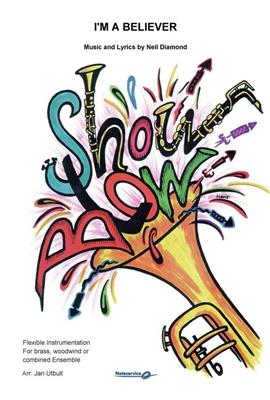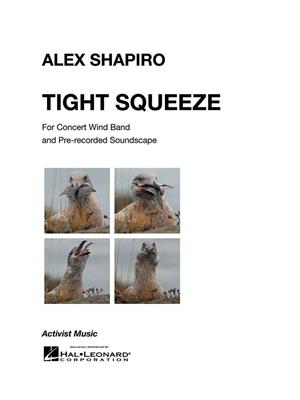Results
-
 £3.95
£3.95ZOO BALL (Part 5 in E flat TC) - Strachan, Keith
Baritone Saxophone, E flat BassThe Zoo Ball is a suite of twelve light-hearted pieces for the young wind of brass band by Keith Strachan.It can be seen from the titles that the young player is introduced to a variety of dance rhythms that are both fun to play and enjoyable to listen to.It is scored in five parts (some of which divide in places) so can be played by ensembles of aroung ten players up to full band. When a fuller instrumentation is available, teachers and conductors are encouraged to vary the scoring as appropriate, particularly in repeated sections. This will allow players to rest occasionally and add changes of colour to the band sound by avoiding excessive doubling.Contents:Lion's PrideHippo's WaltzKangaroo HopEel CongaElephants' MarchSnake, Rattle and RollPanther TangoPenguin PolkaBuffalo BluesBlack Mamba SambaTiger RagMonkey Swing
Estimated dispatch 7-14 working days
-
 £3.95
£3.95ZOO BALL (Percussion) - Strachan, Keith
The Zoo Ball is a suite of twelve light-hearted pieces for the young wind of brass band by Keith Strachan.It can be seen from the titles that the young player is introduced to a variety of dance rhythms that are both fun to play and enjoyable to listen to.It is scored in five parts (some of which divide in places) so can be played by ensembles of aroung ten players up to full band. When a fuller instrumentation is available, teachers and conductors are encouraged to vary the scoring as appropriate, particularly in repeated sections. This will allow players to rest occasionally and add changes of colour to the band sound by avoiding excessive doubling.Contents:Lion's PrideHippo's WaltzKangaroo HopEel CongaElephants' MarchSnake, Rattle and RollPanther TangoPenguin PolkaBuffalo BluesBlack Mamba SambaTiger RagMonkey Swing
Estimated dispatch 7-14 working days
-
 £89.99
£89.99Bolero For Band - Maurice Ravel
Initially commissioned by Ida Rubenstein as a ballet work initially, Maurice Ravel's BOLERO has become his most popular and often-performed orchestra composition, which was a surprise to the composer who described it as seventeen minutes of orchestra without any music. With a structure that is simplicity itself, BOLERO uses two alternating melodies in what Ravel described as a crescendo on commonplace melod[ies]. Mark Rogers' transcription of BOLERO is an entirely complete wind band version of the piece; omitting not a single note or exotic instrument, thereby transferring the brilliance of Ravel_x001A_s orchestral score to the symphonic wind band with as much fidelity to the original as possible. Ravel calls for a very large orchestra (triple woodwinds, saxophones, large brass section, harp, celesta and percussion). Consequently, this transcription of BOLERO contains a large amount of divisi writing. It goes without saying that this transcription will be most successfully performed by large symphonic wind band.
Estimated dispatch 7-14 working days
-
 £76.99
£76.99S'vivon! - Laura Estes
This arrangement is a wonderful addition to the holiday repertoire. It has spirit and features a few twists and turns that make it unique. The percussion is featured, including the use of finger cymbals. Your winds will also enjoy the opportunity for rhythmic handclaps that really bring an element of fun to this piece!
Estimated dispatch 7-14 working days
-
 £57.50
£57.50Forgotten Dreams - Leroy Anderson
FORGOTTEN DREAMS was completed on May 28, 1954. The first performance was a few days later on June 2nd during a recording session for Delta Records in New York, at which time Leroy Anderson performed the piano solo himself. Although the main theme of FORGOTTEN DREAMS was intended to be played on the piano (and with simplicity), the composer_x001A_s band edition of the piece allowed for a solo flute to substitute (Play only in absence of Piano). It is also suggested the melody might be beautifully rendered on vibraphone due to the sustaining quality of that instrument. In any event, this charmingly romantic miniature will delight audiences whenever it is performed. This edition includes a full score.
Estimated dispatch 7-14 working days
-
 £68.80
£68.80Adagio - Kevin Houben
Johannes Brahms can be considered to be one of the top composers of the nineteenth century chamber music. He was a giant in this field and an eminent successor of Beethoven and Haydn. A masterpiece from his chamber music oeuvre is the trio in Eb opus 40 for piano, violin and natural French horn.In 1865, the year of his Horn trio, Brahms's mother Christiane died. It's well known that he fostered deep feelings for her. The slow part of the Horn trio with the tempo indication Adagio Mesto (sad) can be considered as a lamentation for his mother.The first performance of the piece took place in Zrich on 28th November 1865 and it was published a year later in November 1866.In this version for Wind Band Kevin Houben stays as true as possible to the original. The result is a deep and dark orchestration of the wonderful Adagio Mesto. A challenge for any orchestra and extremely suitable as concert piece.
Estimated dispatch 7-14 working days
-
 £84.99
£84.99Don't Start Now
'Don't Start Now', by the British singer Dua Lipa, is the first single from her second studio album, Future Nostalgia. The accompanying music video was uploaded to her YouTube channel upon the single's release. In the song, the singer tells her ex-lover that she is now over him. She gave her first live performance of it on The Graham Norton Show, after that she sang it a number of times at various award shows, TV programmes and music festivals. This arrangement by Tom Stanford will make sure that this disco pop song will also find its way into the world of wind music.
Estimated dispatch 7-14 working days
-
 £81.80
£81.80I'm a Believer - Flex 5 ShowBlow - Neil Diamond
I'm a Believer is a song written by Neil Diamond and recorded by The Monkees for the first time in 1966. Late same year, December 31st, it enteret the first place of the Billboard chart and stayed there for seven successive weeks. This great success made it the bestselling single record in 1967. After this, the song has performed and recorded a numerous times. Among them are by Neil Diamond himself and Robert Wyatt. Smash Mouth also recorded it in 2001 for the first "Shrek" movie.
Estimated dispatch 7-14 working days
-
 £174.10
£174.10Waltz for Debby - Bill Evans
"Waltz for Debby" was written by American jazz pianist and composer Bill Evans (1929-1980). It was heard for the first time on his 1956 debut record "New Jazz Conceptions". This recording made the tune his most famous one, included on several later recordings both for solo piano and his usual trio format. It also became a favorite on almost all his concerts. The tune is a kind of a musical portrait of Evans' niece, Debby Evans. In Scandinavia, Swedish singer Monica Zetterlund made it popular for a wider audience through her 1964-recording accompanied by Evans and his trio. On this recording, the song was renamed "Monicas vals".
Estimated dispatch 7-14 working days
-
 £76.99
£76.99Tight Squeeze - Alex Shapiro
From the acclaimed composer of Paper Cut, AlexShapiro, this unique, high-energy work could bedescribed by the following: imagine Arnold Schoenberg,Henry Mancini, and Charlie Parker walking into adance club in Havana, and staying for three minutes. Tight Squeeze ventures into new territory as it exploreschromaticism and syncopation against a prerecordedpercussion groove. The result is the repertoire's first electroacoustictwelve-tone techno Latin bebop band piece! Okay, maybe Schoenbergdid all that first, but it never sounded quite like this! To perform the piece, you'll need an audio system capable of playing the prerecorded audio tracks from a laptop computer via a small digital audio interface connected to an audio mixer. Download information is provided in the printed piece.
Estimated dispatch 7-14 working days
